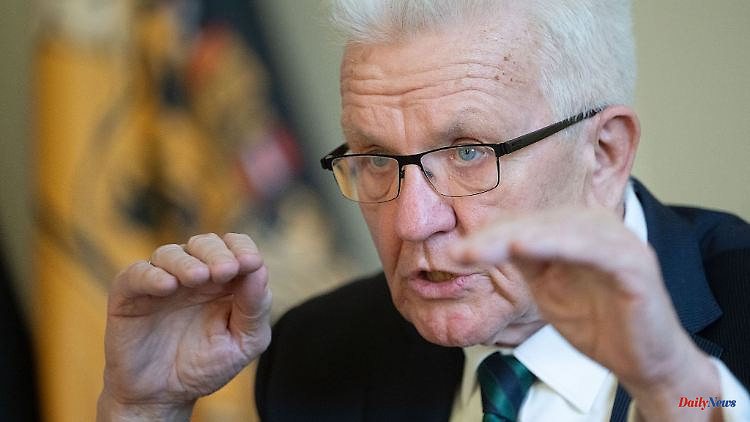Internal I, underscore and gender asterisk on the blackboard? Prime Minister Kretschmann, once a teacher himself, is strictly against it. He warns: You shouldn't overdo it with gender - and receives applause from a surprising quarter.
Stuttgart (dpa / lsw) - Prime Minister Winfried Kretschmann does not believe in gender in the classroom. "The schools have to stick to what the Council for German orthography specifies. Otherwise we won't have a uniform spelling in the end," said the Green politician of the German Press Agency in Stuttgart. "It's bad enough that so many of our elementary school students can't read. You don't have to make it harder for them by writing things in school that you don't even speak."
Kretschmann is concerned about the development of language in general - but the gender debate is not the focus for him, but rather distracts: "I find it regrettable that we often reduce language issues to gender," he says. "Our language is no longer creative. We just overload everything with strange anglicisms," he criticized. "It would be good if we would be more creative with our own language again instead of writing things that cannot be spoken with colons and underscores."
Kretschmann also criticized his own guild, which had to speak in a way that people could understand. "We politicians are masters at generating plastic words." The language gender is irreversible. "But one should at least not overdo it." Kretschmann is convinced: "You can't order language politically."
The state student council had recently demanded that the acceptance of gendering in schools had to increase. The use of gender-appropriate language in written examinations should no longer be counted as a mistake. According to the student representatives, it is no longer up-to-date for teachers to mark negatively with an asterisk, underscore or colon.
According to the Ministry of Education, however, the assessment and correction guidelines for the final exams do not contain any statements on gender. The Ministry was also not aware of any specific cases in which gender-neutral language was marked in exams.
The CDU parliamentary group agrees with the head of government - and makes an offer to Kretschmann: "We'll take our prime minister at his word. We're happy to work together next week to ensure that colons, underscores and asterisks are only used in classrooms if the German language is also used spelling so provides," said parliamentary group leader Manuel Hagel. "Language and writing remain key qualifications in the 21st century. This is not a playing field for any ideologies."
FDP faction leader Hans-Ulrich Rülke, otherwise never at a loss for a critical word, praises the Prime Minister's attitude. One will continue to make sure "that also and above all in the area of the Minister of Education and in school practice itself the gender language can not be up to mischief".
Educational associations, which otherwise criticize Kretschmann and his politics in constant fire, strengthen him on this point. For example, the Association for Education and Training (VBE): many schoolchildren struggle with the language, said the association's chairman Gerhard Brand of the dpa. "It is precisely with this group that the position taken by the state student advisory board in the debate leads to great difficulties."
Students need a clear set of rules for learning the language, and that set of rules already exists, Brand said. "It doesn't allow for creative spellings, asterisks, slashes, underscores, colons, and x's -- let alone their arbitrary use," Brand said. The German language has enough opportunities to gender in accordance with the rules - by simply naming both genders (pupils) or using a neuter (teachers).
The philology association, which represents the high schools, also agrees with Kretschmann. A "nonsensical gender" would make learning more difficult for elementary school students, said the head of the association, Ralf Scholl. "Even in the GDR, attempts were made to raise awareness of the use of language prescribed from above," he said. "Anyone who wants to change gender in their private environment should do so. It has no place in school." According to Scholl, the gender debate belongs in politics lessons, not in German lessons.
The GEW union, on the other hand, advises calm. "In 2023, our students will no longer speak Middle High German. Language is changing and has always been a reflection of social developments," said state chairwoman Monika Stein. "When the language changes, the school also has to deal with it. The teachers are professionals enough to set the right standards in dealing with gender-appropriate language."
In the GEW's view, gender must be evaluated differently in a dictation in which the spelling rules of the Duden are in the foreground than in a text problem in mathematics or in a multi-page essay, in which creative freedom must be possible. In elementary school or with German as a second language, the focus is on learning the language. The education union itself has used the gender asterisk in communication with its members since 2019.












